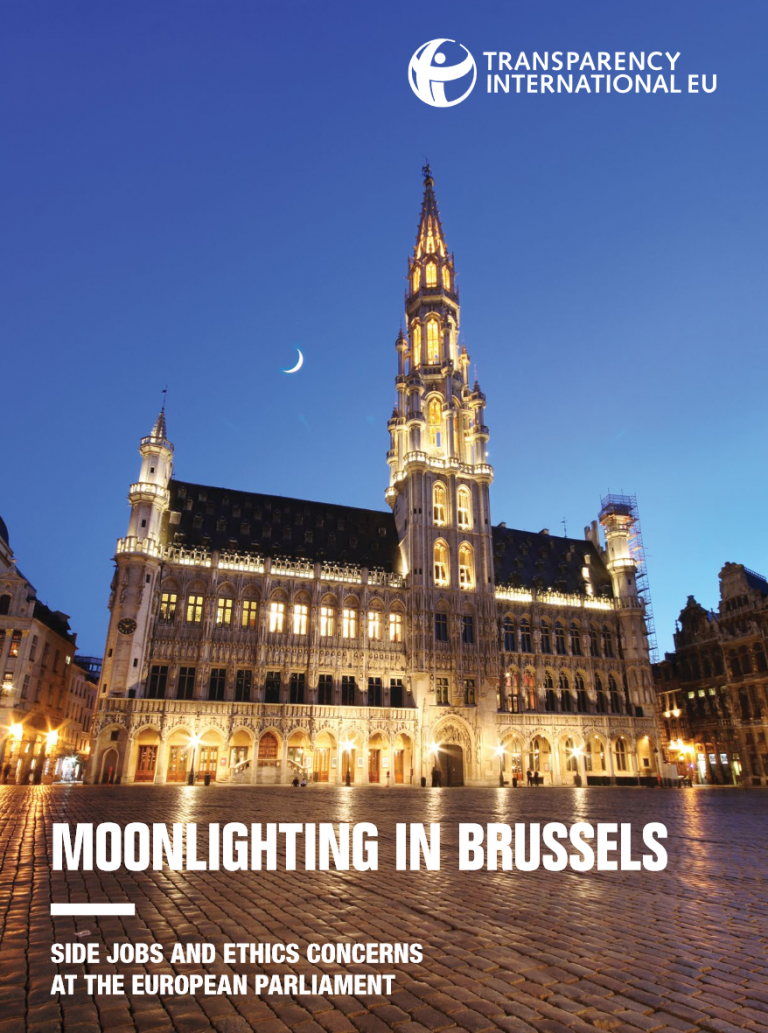Today, a report by Transparency International EU on the outside activities of MEPs shows that up to 104 MEPs have earned more than €100,000 each over the last four years on top of their salaries as full-time MEPs. Three MEPs currently engage in paid activities with companies listed as lobby organisations on the EU Transparency Register, which is in violation of the new rules of procedure and poses serious risks of conflicts of interest.
MEP Sven Giegold, the European Parliament’s rapporteur on Transparency, Accountability and Integrity in the EU Institutions commented:
“The fact that certain MEPs are earning so much on the side of their day jobs is worrying for European democracy. In five years there have been 24 breaches of the Code of Conduct for MEPs but absolutely zero sanctions for those who break the rules, which shows the current set-up of self-control by MEPs themselves simply is not working. It’s time for an independent ethics committee to keep MEPs in check. The Parliament’s rules need to be tightened-up to make sure that Members are working in the interests of their constituents and not lobbying their colleagues for money and MEPs must disclose who employs them, including clients if they are lawyers.
“The Greens/EFA group have tried several times to improve the situation by enforcing the ban on lobbying side jobs by having MEPs list their possible clients and regular checks on Members’ declarations. However, other groups do not seem to want to bring greater scrutiny to their own activities. The Parliament should take this opportunity to look at how best to overhaul the ethics system in tomorrow’s Constitutional Affairs committee. It’s scandalous that far-right MEPs seem to be abusing their positions to make money off of the very same institution they are attempting to undermine.”
The study by Transparency International on MEP’s side jobs: http://transparency.eu/press-release-side-jobs-of-meps-raise-ehtics-concerns/
Green Plan on Transparency and Integrity in the European Parliament: https://www.greens-efa.eu/legacy/fileadmin/dam/Images/Transparency_campaign/Green_Plan_for_Transparency_and_Integrity_in_the_European_Parliament.pdf
BACKGROUND: GREEN/EFA PROPOSALS ON ETHICS AND TRANSPARENCY in the European Parliament and what became of them so far
(1) Members of the European Parliament should be prohibited from engaging in lobbying activities, whether paid or unpaid.
SUCCESS: MEPs are prohibited from engaging in paid lobbying
FAILED: Unpaid lobbying is not covered
(2) MEPs acting as lawyers or consultants should be obliged to state who their clients are
FAILED: This was rejected by the EPP, S&D, ALDE
(3) Members of the European Parliament should be covered by a cooling off period that prohibits them from taking on lobby jobs or other jobs that might cause a risk of a conflict of interest.
FAILED: MEPs could not vote on this because it was declared inadmissible by Parliament President Martin Schulz, who claimed the EU Parliament has no competence to regulate the private lives of MEPs after leaving office.
(4) Members of the European Parliament should be required to declare the exact amounts of any additional income earned.
They should also declare any properties and debts.
FAILED: – No exact amounts because this was voted down by EPP, S&D and ALDE. However, income above 10,000€ per month is to be declared to the nearest 10,000€
FAILED: Property and debt is not to be declared
(5) The ethical committee should be composed of independent external experts, and its powers should be extended so that can initiate its own inquiries into ethics issues in the European Parliament and so it can proactively check MEP’s Declarations of Interest.
Its recommendations on ethics issues should be made public.
FAILED: The advisory committee is still full composed of MEPs, with no independent external experts
FAILED: The Parliament President is the only one that can initiate inquiries, although new wording obliges the President to refer to the Advisory Committee if there is reason to suspect a breach of the Code of Conduct (“shall” instead of “may”). Yet despite the new obligation, the President did not forward a number of reasoned complaints by Transparency International to the Advisory Committee.
SUCCESS: The advisory committee is obliged to publish an annual report

